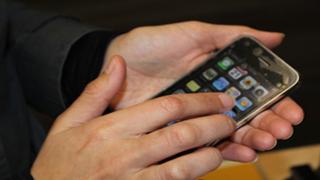Mobile workers increasingly dare IT to rein them in: survey

Mobile-savvy workers armed with smartphones and tablets -- often purchased with personal funds -- are bringing a new jolt of innovation into their organizations. But, at the same time, they are creating new support and security challenges for their IT departments, which often have a different view of how and where personally owned technologies are being or should be used.

That's the finding from new research from Unisys Corporation, conducted by Forrester Research, revealing the widening chasm between increasingly mobile information workers and the enterprise IT departments that support them. The third-annual survey shows that this divide is being driven by a class of "super-connected, tech-savvy mobile workers" who are "defying IT policies by using unsupported, 'bring your own devices' and applications to get work done and serve customers on the front lines of business."
The survey covered 2,609 employees, followed by a second, separate study of 590 business and IT executives.
The survey finds that 44% of information workers now use smartphones at work -- up from 11% in 2009, or a 300% increase in just three years. And many are truly BYODs -- in one-third of the cases, employees — not their employers — are paying for the devices. In addition, 15% now also use tablets, and half are paid for by the employees themselves.
There's also a "Bring Your Own Cloud" movement afoot. Almost four in 10, or 38% of information workers, use a personal application or cloud service to get work done. Nearly 40% of global information workers have seized on personal cloud applications, including file sharing, videoconferencing, and project management, to improve their customer connections, work more productively with colleagues, and make their mobile devices even more valuable as business tools.
However, the mobile workers and IT executives view the business value of these consumer technologies quite differently. For example, while 56% of employees surveyed say that they use unsupported personal devices or apps for work because they need the capabilities and their organization does not provide an alternative. However, 72% of IT executives surveyed say that employees are making use of unsupported devices or apps because of personal preference, not because they need to do critical work.
Mobile workers and IT departments also seem to have different views of corporate support for personally owned technologies in the workplace. For instance, 61% of IT executives believe that their employees will contact the company IT department first when they encounter a problem with a personal device they use for work. However, 64% workers say that they would troubleshoot the problem themselves or contact a friend first, and only 21% would make the IT department the first point of contact for resolution.
IT departments report that they are increasingly supporting company-owned tablets and smartphones in the workplace: 61% of IT respondents say that their organizations provide a high level of IT support for company-owned smartphones and tablets, up from only 27% in 2011. However, in only 18% of the cases does this support extend to employee-owned devices -- a number unchanged from the previous survey.
The research identified a select group of highly connected employees that Unisys terms the “mobile elite.” These individuals, comprising 23% of the total employee respondents, are those "who make intensive use of multiple personally owned devices and applications to get work done." For example, 58% of mobile elites spend their own money to buy things such as personal technology to do their jobs, compared to 27% of average information workers. At least 67% of mobile elites say that use of personal devices or applications makes them more productive and efficient, compared to 43% of average iWorkers.In addition, more than a third of the mobile elite say that using ”bring your own” devices and applications enables them to better serve customers and collaborate with colleagues, compared to 24% of average mobile workers.
This more tech-savvy group "is improving business processes and connecting with customers," the Unisys-Forrester study also concludes. The "most mobile and most self-empowered employees are also often the ones improving work processes (37% of mobile elite employees convinced their boss to significantly change the way they do something at work, compared with 27% of other employees) and using personal apps to better serve customers (33% of mobile elite employees say that the business benefits of employees using personal devices or apps for work allow them to better serve their customers versus 24% of other employees).
However, these mobile elite types present new challenges to IT and the rest of management. For example, these mobile-savvy workers are more than three times as likely as average employees to download unauthorized applications to get work done. In fact, 82% of mobile elite workers report having done this, despite the fact that 75% of IT decision makers say they consider downloading unauthorized software for work as grounds for dismissal.
The Unisys-Forrester research also reveals that IT organizations may not be prepared to address the risks being created by their highly connected, mobile employees. For instance, 54% IT executives say that their organizations have inadequate tools or missing policies to secure employee-owned smartphones. In addition, 71% of IT respondents say that they have implemented password-based solutions as the primary means of user authentication, or plan to do so over the next 12 months. The percentages were far lower for planned use of more sophisticated means of security, including attached-device authentication (22%) and facial biometrics (12%).
Rather than fight this mobile-savvy bunch, or try to regulate them, "IT needs to embrace and empower the mobile elite workers who are driving business improvement," the study recommends. "This mobile elite group of employees is more likely than other employees to work with customers and business partners, making them a crucial group for IT to understand and assist, so that they can boost their productivity and minimize risks."